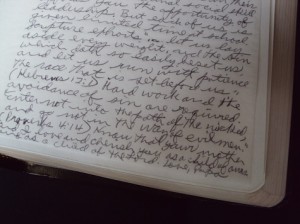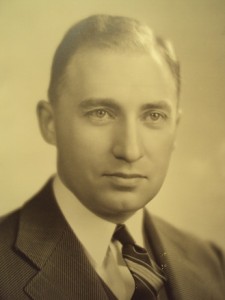Nate died 25 months ago, but his influence continues on. This will be true for all of us. The seeds sown into others’ lives keep on taking root, blossoming and bearing fruit, whether good or bad. All of us are given a lifetime of days during which to do our farming, and it’s up to us what we plant.
Jesus told a fascinating story about seeds. He describes an industrious farmer who worked hard planting a big field, after which he went to bed satisfied with his effort. While he was sleeping, though, his enemy quietly moved in and planted weed-seeds among the wheat.
As the good plants began peeking above the soil, the bad ones did, too, and the wise farmer recognized the subversive work of an adversary. Once the plants were growing together, there wasn’t much he could do, but at harvest time, with extra effort, he solved the dilemma.
By that time the weeds were easy to separate from the wheat, probably because they were taller. Weeds always seem to grow bigger and quicker than the more valuable plants. The farmer had the weeds pulled first, bundling and burning them, followed by the wheat that had been left standing. It was hard work, but in the end he got the cash crop he’d originally planted.
This afternoon I found fresh evidence of Nate’s profitable farming. I opened one of our many Bibles to check a passage and noticed his handwriting in the front. He’d been planting heart-seeds in one of his children who was leaving home for college, gifting him with a Bible and words of affirmation on the flyleaf:
“As your father, I’ve noticed your ability to befriend others with ease; of kindness and patience with small children; of self-confidence and grace with your peers.”
He went on to challenge him to use college years to develop the talents God had given him. Then he wrote, “Your abilities can be used to worship God and also to lead others to Christ and to make the right choices in their lives.” He continued, quoting from his favorite Scripture passage, giving his son a heads-up about avoiding sin.
In concluding he wrote, “Know that your mother and I love and cherish you as a child of ours and as a child of the Lord. Love, Papa.”
Nate was planting good seeds, regardless of the enemy’s desire to mix bad in with the his good. Reading the words he wrote challenged me to keep farming, despite unwittingly planting bad seeds among the good. According to Scripture, the harvest can be 100 times what was sown, which makes it doubly important to “plant positive.”
But the scriptural parable can encourage even those of us who occasionally mess up, telling us that all it takes is one good seed to bring a magnificent crop.
“Though it is the smallest of all seeds, yet when it grows, it is the largest of garden plants and becomes a tree.” (Matthew 13:32)





